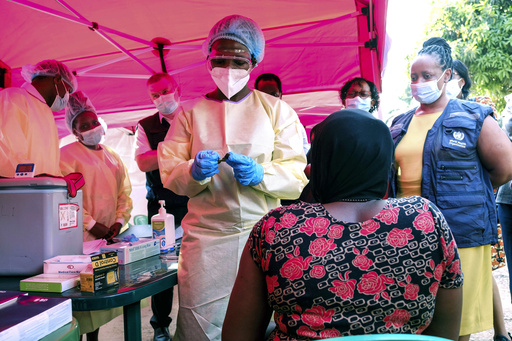
KAMPALA, Uganda — On Monday, Uganda’s health authorities initiated a clinical trial for a vaccine targeting the Sudan strain of Ebola, amid an outbreak that has resulted in one confirmed fatality.
The trial focuses on health workers and individuals who have come into contact with this particular strain, following the announcement of a nurse’s death in the capital city, Kampala, just four days prior. As of the latest reports, two additional cases have been identified among relatives of the initial victim.
Investigations into the outbreak’s origins are currently underway. Ebola is transmitted through direct contact with the bodily fluids of an infected individual or with contaminated objects. Common symptoms include fever, vomiting, diarrhea, muscle aches, and in severe cases, both internal and external bleeding.
The challenge in addressing this outbreak is compounded by Kampala’s population of approximately four million people, which is highly mobile. The deceased nurse had initially sought medical treatment at a facility on the outskirts of Kampala and later traveled to Mbale in eastern Uganda, where he was admitted to a public hospital. Reports indicate that he also consulted a traditional healer during this period.
Health authorities have tracked at least 234 individuals who came into contact with the infected nurse, according to the Ministry of Health. They have access to over 2,000 doses of a candidate vaccine developed for the Sudan strain, provided by the International AIDS Vaccine Initiative (IAVI).
Matshidiso Moeti, the WHO regional director for Africa, commented on the trial, calling it a significant achievement in public health responses and highlighting the importance of global cooperation in ensuring health security.
This outbreak represents the first instance of Ebola in Uganda since the recent withdrawal of the United States from the World Health Organization, as well as the freezing of foreign assistance ordered by the former administration.
Uganda has experienced several Ebola outbreaks historically, including one in 2000 that resulted in numerous fatalities. Contact tracing remains crucial to controlling the virus, which causes a severe form of hemorrhagic fever. A potential vaccine, rVSV-ZEBOV, was previously employed to inoculate approximately 3,000 individuals at risk during a Zaire strain outbreak in eastern Congo from 2018 to 2020, demonstrating efficacy in limiting disease transmission.
The identification of Ebola in Uganda adds to a growing trend of viral hemorrhagic fevers in the East African region. Last month, Tanzania reported an outbreak of Marburg disease, which bears similarities to Ebola, while Rwanda declared its own Marburg outbreak resolved in December.
Although the natural reservoir for the Ebola virus is not definitively known, researchers suspect that the first human cases in an outbreak may result from contact with infected animals or consumption of their raw meat.
The Ebola virus was first recognized in 1976 during simultaneous outbreaks in South Sudan and Congo, occurring near the Ebola River, which later lent its name to the disease.

